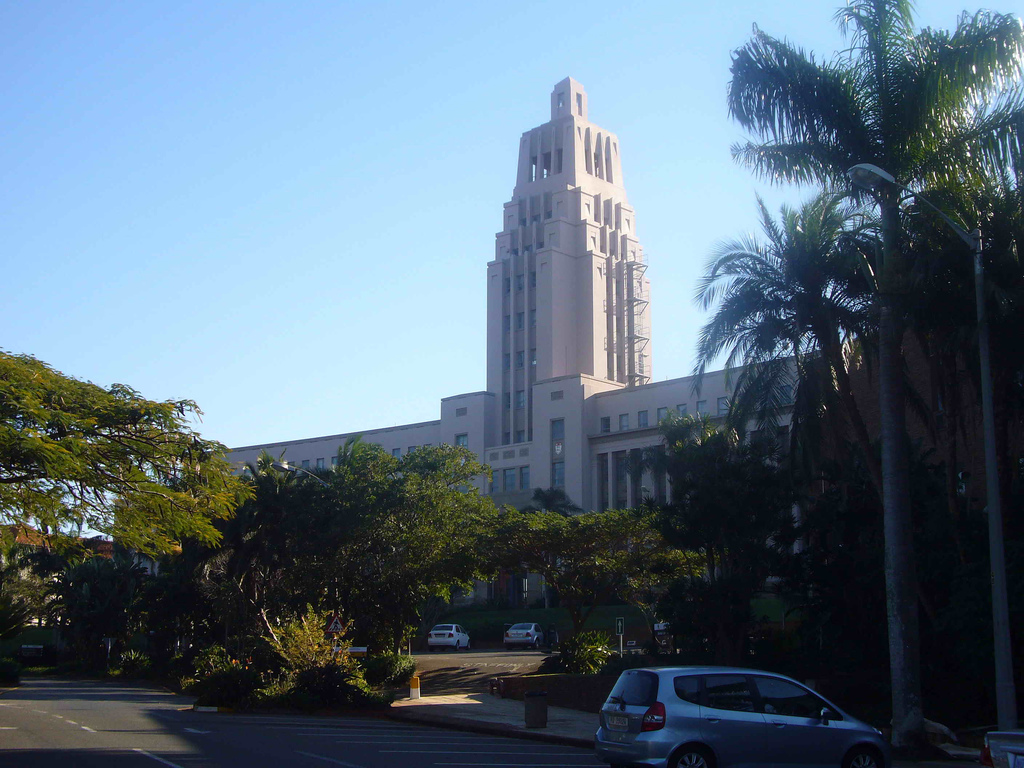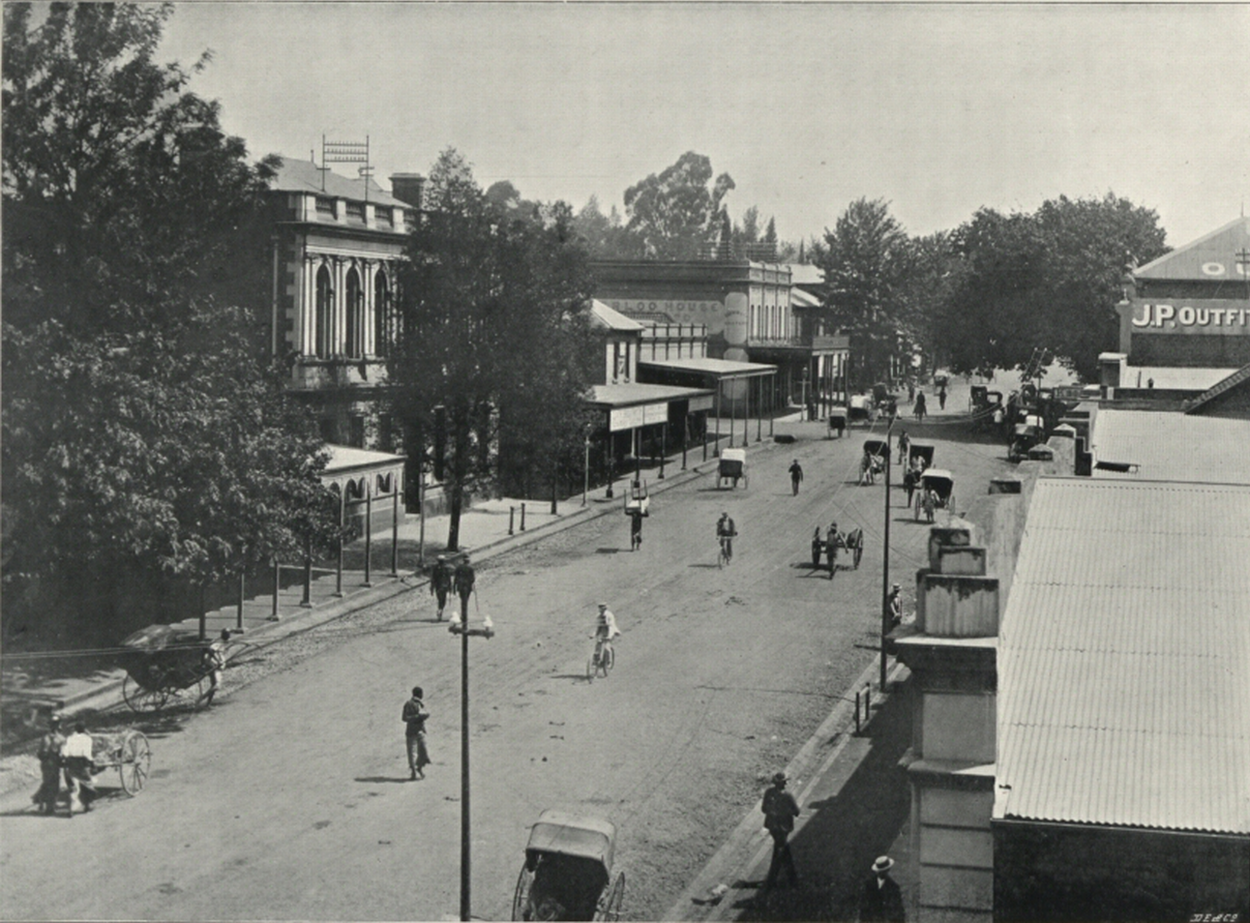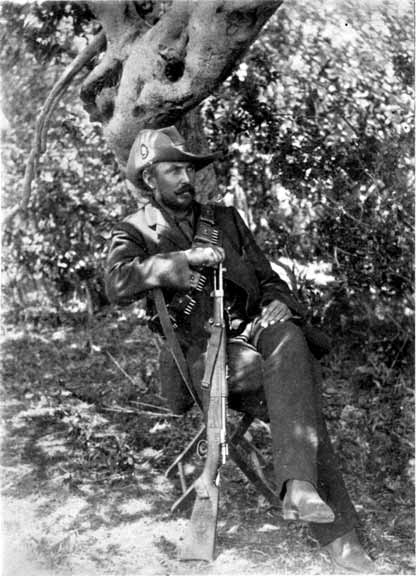|
University Of Natal
The University of Natal was a university in the former South African province Natal which later became KwaZulu-Natal. The University of Natal no longer exists as a distinct legal entity, as it was incorporated into the University of KwaZulu-Natal on 1 January 2004. It was founded in 1910 as the Natal University College in Pietermaritzburg and expanded to include a campus in Durban in 1931. In 1947, the university opened a medical school for non-white students in Durban. The Pietermaritzburg campus was known for its agricultural engineering programmes, hence the nickname "the farmers" whilst the Durban campus was known as "the engineers," as it concentrated on other engineering programmes. The Council of the University of Natal voted on 31 May 2002 to offer the post of Vice-Chancellor and University Principal to world-renowned medical scientist and former Medical Research Council President - Professor Malegapuru Makgoba who assumed office on the 1 September 2002. He was entrust ... [...More Info...] [...Related Items...] OR: [Wikipedia] [Google] [Baidu] |
Pietermaritzburg
Pietermaritzburg (; Zulu: umGungundlovu) is the capital and second-largest city in the province of KwaZulu-Natal, South Africa. It was founded in 1838 and is currently governed by the Msunduzi Local Municipality. Its Zulu name umGungundlovu is the name used for the district municipality. Pietermaritzburg is popularly called Maritzburg in Afrikaans, English and Zulu alike, and often informally abbreviated to PMB. It is a regionally important industrial hub, producing aluminium, timber and dairy products, as well as the main economic hub of Umgungundlovu District Municipality. The public sector is a major employer in the city due to local, district and provincial governments located here. The city has many schools and tertiary education institutions, including a campus of the University of KwaZulu-Natal. It had a population of 228,549 in 1991; the current population is estimated at over 600,000 residents (including neighbouring townships) and has one of the largest populati ... [...More Info...] [...Related Items...] OR: [Wikipedia] [Google] [Baidu] |
John Bews
John William Bews (16 December 1884 — 10 November 1938) was a Scottish born South African botanist. Early life Bews was born in Kirkwall on the Orkney Islands of Scotland. His parents were farmers. He did his schooling in Kirkwall and later studied mathematics, natural philosophy, chemistry, geology, Latin, English and logic at Edinburgh University. He took a second degree in botany, chemistry and geology in 1907. Botanical work In 1909 Bews was appointed professor of botany and geology at the newly established Natal University College in Pietermaritzburg, South Africa. Originally intending to study plant physiology, the challenges of a new and under-resourced laboratory and the new (to him) vegetation of the Natal Midlands meant that he changed the direction of his study to field work. Philosophy Bews was a protege of General Jan Smuts and was influenced by his ideas on holism. "Botany, patriotism and the politics of national unity were bound up... Bews made this links ... [...More Info...] [...Related Items...] OR: [Wikipedia] [Google] [Baidu] |
Educational Institutions Disestablished In 2004
Education is a purposeful activity directed at achieving certain aims, such as transmitting knowledge or fostering skills and character traits. These aims may include the development of understanding, rationality, kindness, and honesty. Various researchers emphasize the role of critical thinking in order to distinguish education from indoctrination. Some theorists require that education results in an improvement of the student while others prefer a value-neutral definition of the term. In a slightly different sense, education may also refer, not to the process, but to the product of this process: the mental states and dispositions possessed by educated people. Education History of education, originated as the transmission of cultural heritage from one generation to the next. Today, educational aims and objectives, educational goals increasingly encompass new ideas such as the Philosophy of education#Critical theory, liberation of learners, 21st century skills, skills needed fo ... [...More Info...] [...Related Items...] OR: [Wikipedia] [Google] [Baidu] |
Educational Institutions Established In 1910
Education is a purposeful activity directed at achieving certain aims, such as transmitting knowledge or fostering skills and character traits. These aims may include the development of understanding, rationality, kindness, and honesty. Various researchers emphasize the role of critical thinking in order to distinguish education from indoctrination. Some theorists require that education results in an improvement of the student while others prefer a value-neutral definition of the term. In a slightly different sense, education may also refer, not to the process, but to the product of this process: the mental states and dispositions possessed by educated people. Education originated as the transmission of cultural heritage from one generation to the next. Today, educational goals increasingly encompass new ideas such as the liberation of learners, skills needed for modern society, empathy, and complex vocational skills. Types of education are commonly divided into form ... [...More Info...] [...Related Items...] OR: [Wikipedia] [Google] [Baidu] |
Defunct Universities And Colleges In South Africa
{{Disambiguation ...
Defunct (no longer in use or active) may refer to: * ''Defunct'' (video game), 2014 * Zombie process or defunct process, in Unix-like operating systems See also * * :Former entities * End-of-life product * Obsolescence Obsolescence is the state of being which occurs when an object, service, or practice is no longer maintained or required even though it may still be in good working order. It usually happens when something that is more efficient or less risky r ... [...More Info...] [...Related Items...] OR: [Wikipedia] [Google] [Baidu] |
Universities In KwaZulu-Natal
A university () is an institution of higher (or tertiary) education and research which awards academic degrees in several academic disciplines. Universities typically offer both undergraduate and postgraduate programs. In the United States, the designation is reserved for colleges that have a graduate school. The word ''university'' is derived from the Latin ''universitas magistrorum et scholarium'', which roughly means "community of teachers and scholars". The first universities were created in Europe by Catholic Church monks. The University of Bologna (''Università di Bologna''), founded in 1088, is the first university in the sense of: *Being a high degree-awarding institute. *Having independence from the ecclesiastic schools, although conducted by both clergy and non-clergy. *Using the word ''universitas'' (which was coined at its foundation). *Issuing secular and non-secular degrees: grammar, rhetoric, logic, theology, canon law, notarial law.Hunt Janin: "The university ... [...More Info...] [...Related Items...] OR: [Wikipedia] [Google] [Baidu] |
University Of Natal
The University of Natal was a university in the former South African province Natal which later became KwaZulu-Natal. The University of Natal no longer exists as a distinct legal entity, as it was incorporated into the University of KwaZulu-Natal on 1 January 2004. It was founded in 1910 as the Natal University College in Pietermaritzburg and expanded to include a campus in Durban in 1931. In 1947, the university opened a medical school for non-white students in Durban. The Pietermaritzburg campus was known for its agricultural engineering programmes, hence the nickname "the farmers" whilst the Durban campus was known as "the engineers," as it concentrated on other engineering programmes. The Council of the University of Natal voted on 31 May 2002 to offer the post of Vice-Chancellor and University Principal to world-renowned medical scientist and former Medical Research Council President - Professor Malegapuru Makgoba who assumed office on the 1 September 2002. He was entrust ... [...More Info...] [...Related Items...] OR: [Wikipedia] [Google] [Baidu] |
University Of Durban-Westville
The University of Durban-Westville (UDW) was a university situated in Westville, a town situated near Durban, South Africa, which opened in 1972. It is now one of the campuses of the University of KwaZulu-Natal. It was initially established for Indians, as during apartheid there were few universities that admitted non-White students. Prior to the building of UDW, Indian students traveled by ferry to a facility at Salisbury Island, which had been established in 1961 as the University College for Indians UDW offered degrees in commerce, the arts, law, engineering, and health sciences and sciences in general. Later an indoor sports centre was built, which hosted national sporting events. UDW was the hub of many student anti-apartheid political rallies. Campaign of intimidation In 1995 it was reported that staff members had been subjected to death threats, violence, break-ins to their homes and offices and smear campaigns by other staff members. [...More Info...] [...Related Items...] OR: [Wikipedia] [Google] [Baidu] |
Boer War
The Second Boer War ( af, Tweede Vryheidsoorlog, , 11 October 189931 May 1902), also known as the Boer War, the Anglo–Boer War, or the South African War, was a conflict fought between the British Empire and the two Boer Republics (the South African Republic and the Orange Free State) over the Empire's influence in Southern Africa from 1899 to 1902. Following the discovery of gold deposits in the Boer republics, there was a large influx of "foreigners", mostly British from the Cape Colony. They were not permitted to have a vote, and were regarded as "unwelcome visitors", invaders, and they protested to the British authorities in the Cape. Negotiations failed and, in the opening stages of the war, the Boers launched successful attacks against British outposts before being pushed back by imperial reinforcements. Though the British swiftly occupied the Boer republics, numerous Boers refused to accept defeat and engaged in guerrilla warfare. Eventually, British scorched e ... [...More Info...] [...Related Items...] OR: [Wikipedia] [Google] [Baidu] |
Mabel Palmer
Mabel Palmer (1876–1958) also known as Mabel Atkinson in her first career, was a British-born, suffragist, journalist and lecturer. After her marriage, she began a second career as a South African educator and academic, using her married name. One of her most noted accomplishments came after her retirement from teaching, when she spearheaded a movement to provide university education for non-white students. After providing free courses in her home for a decade, she became director of the segregated courses offered by the Natal University College, serving from 1945 to 1955. After her second retirement, Palmer continued publishing until her death in 1958. Early life Mabel Atkinson was born on 22 May 1876 in Broomley, Northumberland, England to Jane (née Elliott) and John Boland Atkinson. Her father was an inspector of mines, and her mother an activist suffragette, who were progressive, believing in both women's education and employment. In 1894, Atkinson enrolled at Glasgow U ... [...More Info...] [...Related Items...] OR: [Wikipedia] [Google] [Baidu] |
Louis Botha
Louis Botha (; 27 September 1862 – 27 August 1919) was a South African politician who was the first prime minister of the Union of South Africa – the forerunner of the modern South African state. A Boer war hero during the Second Boer War, he eventually fought to have South Africa become a British Dominion. Early life Louis Botha was born in Greytown, Natal one of 13 children born to Louis Botha Senior (26 March 1827 – 5 July 1883) and Salomina Adriana van Rooyen (31 March 1829 – 9 January 1886). He briefly attended the school at Hermannsburg before his family relocated to the Orange Free State. The name Louis runs throughout the family, with every generation since General Louis Botha having the eldest son named Louis. Botha had a younger brother Chris (1864-1902), who was a police officer and like Louis a military commander in the Second Boer War. Zulu conflict Louis Botha led " Dinuzulu's Volunteers", a group of Boers that had supported Dinuzulu against Zibhe ... [...More Info...] [...Related Items...] OR: [Wikipedia] [Google] [Baidu] |
Ernest Jansen
Ernest George Jansen (1881–1959) was the second to last Governor-General of the Union of South Africa, holding office from 1951 until his death in 1959. Born on 7 August 1881, he graduated with a law degree from the University of the Cape of Good Hope in 1905, and was admitted as an advocate (the South African equivalent of a barrister) in 1913. An ardent champion of Afrikaner interests, he joined the National Party in 1915 and was a member of Parliament from 1915 to 1920, from 1921 to 1943, and from 1947 to 1950. In 1919, he was a member of a delegation which tried unsuccessfully to persuade American president Woodrow Wilson to call for independence to be restored to the former Boer republics of the Orange Free State and the Transvaal. In Parliament, Jansen was Speaker of the House of Assembly of South Africa from 1924 to 1929, Minister of Native Affairs and of Irrigation from 1929 to 1934, and Speaker again from 1934 to 1943. He was highly regarded for his firm and im ... [...More Info...] [...Related Items...] OR: [Wikipedia] [Google] [Baidu] |




